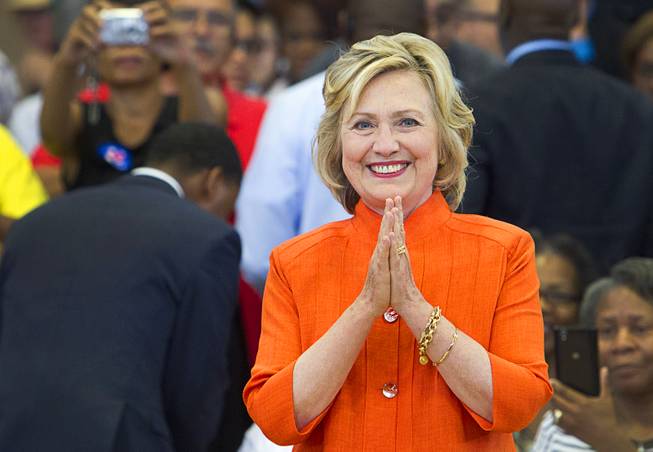
Democratic presidential candidate and former Secretary of State Hillary Rodham Clinton arrives for a town-hall meeting at Pearson Community Center on Tuesday, Aug. 18, 2015, in North Las Vegas.
Tuesday, Sept. 1, 2015 | 2 a.m.
Hillary Rodham Clinton's plan for lowering the cost of higher education and reducing the roughly $1.2 trillion student loan debt held by American students could strengthen Nevada's postsecondary institutions while saving money for the state's college students, local education experts say.
But if you think those benefits would be enough for the state to embrace the plan, those same experts say, you don't know Nevada.
Clinton's "New College Compact" would funnel $350 billion toward states that agree to increase funding for higher education and make sure students are graduating on time. One-third of the funding would be set aside to allow students to refinance existing loans at lower interest rates, while the rest would go toward grants designed to keep costs down for state colleges and universities, as well as make community college free.
Universities and community colleges would benefit by drawing the grants and more state funding, while the Clinton campaign claims that a Nevada family making less than $25,000 a year would save $30,000 in college expenses over four years. In addition, the camp says, a student who takes out around $30,000 in loans would save $4,000 in interest.
It’s just one proposal out of a handful of plans put forth by state governments and other presidential candidates, but it could have a big impact on Nevada, say local education experts.
“There have been a lot of budget cuts here in the last few years,” said Dr. Hugo Garcia, professor at UNLV’s college of education. “I think this is something that the state would really look into.”
Nancy Brune, executive director of the research-focused Guinn Center, called the plan "a step in the right direction."
“Community college here is relatively cheap compared to California or Texas, but there are a lot of College of Southern Nevada students working full-time or part-time,” she said. “It’s a combination of the wages and the family demands. It’s a struggle.”
But even if Clinton can win the presidency and enact her plan, there are hurdles to putting it into effect in Nevada. The biggest one is whether state lawmakers would even agree to go along with it.
Nevadans are notoriously suspicious of the federal government, and, perhaps more than other states, would be likely to resist an attempt by Washington to trade large sums of money in return for a say in the state’s budget priorities. If states don’t agree to do that, they get nothing under Clinton’s plan.
The state has often chafed at the presence of federal groups like the Bureau of Land Management, and until recently had been resistant to increase funding for education. But then again, Nevada was also the only state with a Republican governor to establish its own healthcare exchange under Obamacare. The Nevada Health CO-OP, one of five insurers in the exchange, announced it was going out of business late last month.
“The dilemma for states is the money on the table that they’d be leaving if they didn’t get on board,” said Garcia. “[On the other hand,] states don’t want to have their hands tied.”
“This would really be a state by state thing,” he said.
Another major hurdle is funding. Clinton claims she would pay for the $350 billion program by closing tax loopholes on the richest Americans, but that will likely face stiff opposition from anti-tax Republicans in Congress.
“It will be a costly program,” said Kim Nehls, education professor at UNLV and executive director of the Association for the Study of Higher Education. “I think that’s the big question.”
But for Nevada, experts say, it's definitely worth considering.
Nevada was one of many states that saw drastic cuts to its higher education system in the aftermath of the Great Recession. Higher education funding in the state was 31 percent lower in 2014 than it was in 2008, and college enrollment also took a nose dive. In order to offset the loss in funding, colleges around the country simply raised tuition. In Nevada, tuition has increased nearly 50 percent since the economic downturn.
And while enrollment is starting to rise once again, so too is student loan debt. In Nevada, the average student loan debt is around $21,000. While that is relatively low compared to other states, nearly half of the state’s university students hold student loan debt.
“Tuition is rising faster than inflation and has been for quite a while,” Nehls said. “Any cost-cutting measures … would be welcome.”
Clinton’s campaign estimates that around 11,000 community college students and 32,000 students in Nevada’s four-year colleges would benefit from the program.
The plan has been mostly met with praise by Democrats, though some liberals — including Democratic hopeful Sen. Bernie Sanders — criticized it for not going far enough. Sanders' plan aims to make tuition at public community colleges and universities completely free.
Still, it’s early in the campaign. Nehls and Garcia said proposals would continue to evolve as candidates are forced to be more specific about the details.
“College affordability is always going to be an important issue, and it’s especially going to be a big issue in this election,” Nehls said.

Join the Discussion:
Check this out for a full explanation of our conversion to the LiveFyre commenting system and instructions on how to sign up for an account.
Full comments policy